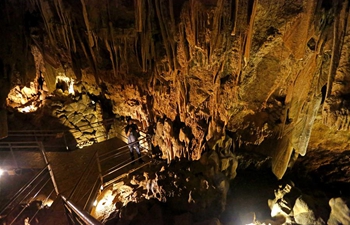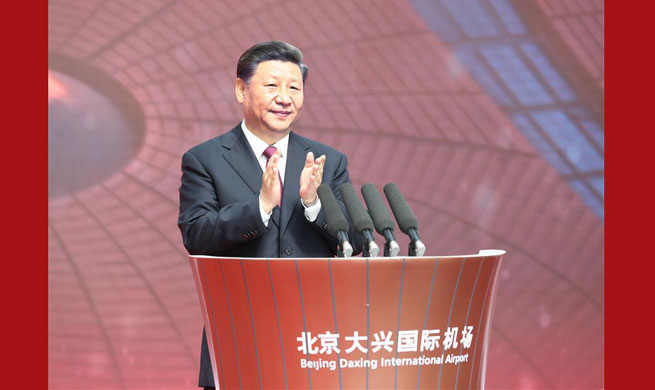by Ren Ke
BERLIN, Sept. 26 (Xinhua) -- One who comes to Germany can easily find that the topic of climate change is everywhere, literally.
In newspapers and TV programs, people discuss it endlessly, in commercial advertising companies promote their climate-friendly products. Some people are even calling for eating less meat to reduce emission in animal husbandry.
It's visible on the streets too. The building of the headquarters of the Christian Democratic Union displays a huge slogan "Monday to Friday for Future," echoing the global movement for climate change every Fridays. The German icebreaker has left for an Arctic research expedition last week, "for climate protection," as a poster outside the Ministry of Education Research reads.
A recent survey released by German public broadcaster ARD showed that 63 percent of German voters wanted the government to prioritize climate, even at the cost of economic growth. Only 24 percent of respondents believed that economic growth is more important than climate issue.
The most important news in Germany in recent days are all about climate change. Last Friday, the German federal government announced a package of new measures, named "2030 climate protection program," in a bid to achieve its emission goals and to avoid defaulting on its 2015 Paris accord promises.
Many are delighted over it, but others are disappointed. While the government was holding a press conference, a record number of protestors, up to 250,000, took to the streets in Berlin to call for more measures.
Prof. Ottmar Edenhofer, director and chief economist of the Potsdam Institute for Climate Impact Research (PIK), told Xinhua that it is true that Germany is a climate-conscious country.
"That is not least embodied in the person of Chancellor Angela Merkel, who is herself a natural scientist by training and well aware of the climate problem. But also civil society in Germany is lively and vocal in climate issues," said Edenhofer.
Due to her long-standing appeal for dealing with climate change and international cooperation, Merkel has been nicknamed "Climate Chancellor." During her tenure, Germany has expanded renewables such as wind and solar but is slow to phase out coal-fired power stations due to economic reasons, one of the major points for the public's disappointment.
The refugee crisis has passed, and its social impacts on Germany, especially the rise of the far-right populism, seem to be under control. Now climate change has become the most important issue of German politics and the whole society, analysts believed.
This development is so significant that the political landscape has been changed. Now the Green Party, the most vocal group for dealing with climate change, sits stably as the second strongest party in polls, surpassing the traditional No.2 -- German Social Democratic Party.
Berthold Kuhn, a political scientist on sustainable development with the Free University of Berlin told Xinhua that besides the strengthened international cooperation for dealing with climate change, the young generation who grasped for the first time the real science, helped pushed climate change as the top priority.
Initiated by the Swedish girl Greta Thunberg, the Fridays for Future movement has spread across Europe, America and some other regions. Those students and young people warned against the rising sea level and the rising temperature, which has been proved in the latest report by the UN Inter-government Panel on Climate Change (IPCC) released on Wednesday.
In his biography of Merkel, Prof. Matthew Qvortrup at Coventry University in Britain said Merkel is like the personification of the post-war new Germany, who believed a strong Germany should use its power to serve as a model in the world.
Edenhofer, who appeals to greater efforts for the issue than that of the government's program, believed that economically speaking, the world must achieve a growth that does not rely on carbon dioxide emissions anymore, or green growth.
"In this respect, Germany has a crucial role in proving that carbon-neutral growth is possible," said Edenhofer. He believed that the German government's program has its flaws, but the country is trying hard to live up to its European commitments.
"We are certainly no longer a climate forerunner, yet we do try our best to achieve the climate goals," said Edenhofer.













